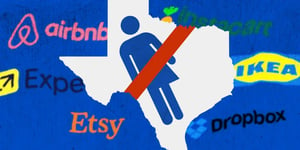written by Ethan Brooks
AUSTIN, Texas, Sept. 11, 2025 — Texas lawmakers recently passed a significantly stricter version of North Carolina’s 2016 “bathroom bill,” yet many major corporations that once vociferously opposed such legislation have remained notably silent.
Why is corporate response to Texas’s new bathroom bill different from North Carolina’s in 2016? Many companies appear to be prioritizing avoiding conservative boycotts and potential repercussions from a Trump administration over supporting LGBTQ+ rights.
In the wake of North Carolina’s 2016 “bathroom bill,” which barred transgender people from using bathrooms aligned with their gender, major companies and their CEOs were quick to condemn the measure. PayPal canceled an expansion, the NCAA pulled tournaments, and 68 companies, including Apple and Nike, signed a brief supporting the Department of Justice’s effort to block the law.
However, when Texas passed its own, harsher version of the bill late last month, the response from these same corporate players was muted. A survey of major companies that had previously signed the 2016 amicus brief revealed a stark silence; only Affirm and TD Bank declined to comment, with no other corporations issuing public statements against the Texas legislation.
“The rise and fall of corporate support for things like LGBTQ rights and representation shows how weak corporations’ support for LGBTQ rights is,” said Joanna Wuest, an assistant professor of women’s, gender, and sexuality studies at Stony Brook University. Wuest, who has studied corporate support for LGBTQ+ rights since 2020, notes that this lack of engagement is now the standard.
The list of companies that previously signed the amicus brief includes Accenture, Airbnb, American Airlines, Apple, Biogen, Bloomberg LP, Boehinger Ingleheim USA, Box, Capital One Financial Corporation, Cisco Systems, Consumer Technology Association, Corning Incorporated, Cummins, Dropbox, Dupont, eBay, Etsy, Everlaw, Expedia, FiftyThree, Gap, General Electric Company, Glassdoor, Grokker, Hilton Worldwide, Honor, IBM Corporation, IKEA North American Services, Instacart, Intel Corporation, John Hancock, Levi Strauss & Co., LinkedIn Corporation, Logitech, Marriott International, Massachusetts Mutual Life Insurance Company, Microsoft, Mitchell Gold + Bob Williams, Morgan Stanley, Nextdoor, Nike, PayPal, Quotient, RBC Capital Markets, Red Hat, Replacements Ltd., Salesforce, Slack, SV Angel, TD Bank NA, The Dow Chemical Company, Thermo Fisher Scientific, ThirdLove, Tumblr, United Airlines, Williams-Sonoma, Yelp, ZestFinance, and Zynga.
When reached out to between August 29 and September 9, most of these companies offered no comment.
Corporate support for transgender and LGBTQ+ rights has dropped significantly in the past year. A survey of over 200 corporations found that nearly 40 percent planned to reduce Pride Month engagement in the early months of a second Trump administration. Companies like Anheuser-Busch have ended their support for Pride festivals, and others have withdrawn from the Human Rights Campaign’s Corporate Equality Index.
“One simple way of putting it is that many of these corporations just don’t see the added benefit to putting themselves on the line anymore,” Wuest stated.
President Donald Trump’s administration is seen as a key factor. Heron Greenesmith, deputy director of policy at the Transgender Law Center, said the current administration “has made it a mission to impose harsh consequences on those who support and protect transgender people’s rights.” The administration has also targeted organizations supporting marginalized communities.
Jared Todd, a press secretary for the Human Rights Commission, noted that the “Trump Administration’s baseless crusade against diversity and inclusion has led to businesses operating in fear and uncertainty.”
Historically, companies viewed supporting trans rights as beneficial for brand image and for attracting progressive consumers and employees. However, conservative backlash and boycotts, such as those against Target and Budweiser, have shifted corporate incentives. “They’re making considerations based on conservative boycotts,” Wuest explained.
Past corporate activism, though sometimes performative, proved consequential. North Carolina was compelled to repeal its 2016 law to avoid billions in lost revenue. In 2021, South Dakota’s then-Governor Kristi Noem vetoed a bill restricting transgender athletes after facing significant backlash from the state’s chamber of commerce.
“Corporate activism] can have huge effects, but at the same time, it’s ultimately downstream from a lot of bottom-line interests, and so when those things disappear, the corporations aren’t going to put their necks out,” Wuest said.
Currently, 19 states have adopted variations of the transgender bathroom ban. The new Texas bill carries severe penalties: $25,000 for first-time offenders and $125,000 for subsequent violations by government agencies or public institutions that allow transgender people to use facilities matching their gender.
Greenesmith described the implications for transgender, intersex, and nonbinary people in Texas as “staggering,” noting that the bill “deputizes a legion of potty-police who are incentivized to tattle on anyone whom they suspect is trans or nonbinary using the bathroom.” The bill’s ramifications extend to all gender nonconforming individuals.

